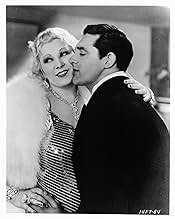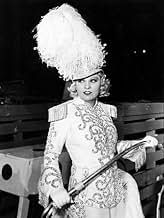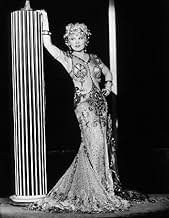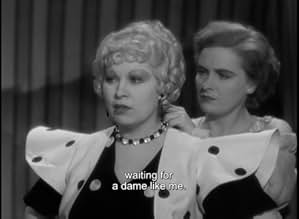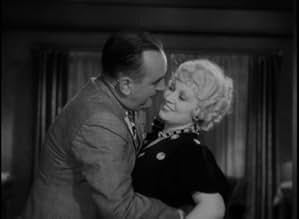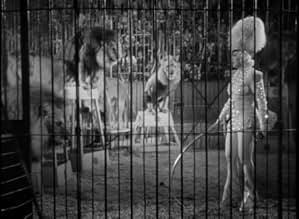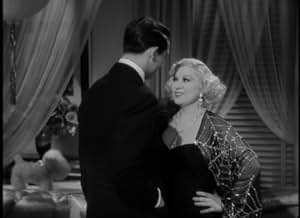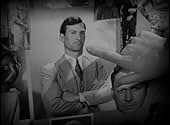PUNTUACIÓN EN IMDb
6,9/10
4,2 mil
TU PUNTUACIÓN
Tira, una artista de circo, busca una vida mejor en compañía de los hombres ricos de Nueva York con complicaciones cómicas improbables en el camino.Tira, una artista de circo, busca una vida mejor en compañía de los hombres ricos de Nueva York con complicaciones cómicas improbables en el camino.Tira, una artista de circo, busca una vida mejor en compañía de los hombres ricos de Nueva York con complicaciones cómicas improbables en el camino.
- Dirección
- Guión
- Reparto principal
- Premios
- 2 premios en total
William B. Davidson
- The Chump Ernest Brown
- (as Wm. B. Davidson)
Bobby Barber
- Man In Crowd
- (sin acreditar)
Eddie Borden
- Carnival Sideshow Spectator
- (sin acreditar)
George Bruggeman
- Omnes
- (sin acreditar)
Morrie Cohan
- Bartons Chauffeur
- (sin acreditar)
Monte Collins
- Sailor at Circus
- (sin acreditar)
Ray Cooke
- Sailor at Circus
- (sin acreditar)
Reseñas destacadas
The dancer and lion tamer of a circus Tira (Mae West) meets with an admirer at a hotel room and her lover, the pickpocket Slick Wiley (Ralf Harolde) try to steal the man and hits his head with a bottle. Slick believes that he had killed the man and flees, but he is arrested by the police.
Tira fears to be betrayed by Slick and asks for a loan to Big Bill Barton (Edward Arnold) to leave the place. However, he offers her the money provided she accepts to put her head into the mouth of a lion. The show is a success and the circus move to New York, where the millionaire Kirk Lawrence (Kent Taylor), who is engaged but becomes her "protector", giving expensive gifts to Tira. But when she meets Kirk's partner Jack Clayton (Cary Grant), they fall in love with each other and decide to get married. But Big Bill does not want to lose his great attraction and plots a scheme with Slick to call off the engagement of Clayton and Tira.
"I'm No Angel" is one of the most important films of the controversial Mae West, the actress who saved Paramount Pictures from bankruptcy after the Great Depression. This actress was responsible for the censorship code in Hollywood and her malicious quotes are great. For example, "When I'm Good, I'm Very Good. But, When I'm Bad... I'm Better"; or the song "No One Does It Like a Dallas Man", that was forced to be changed "No One Loves Me Like a Dallas Man". My vote is seven.
Title (Brazil): "Santa Não Sou" ("Saint I am not")
Tira fears to be betrayed by Slick and asks for a loan to Big Bill Barton (Edward Arnold) to leave the place. However, he offers her the money provided she accepts to put her head into the mouth of a lion. The show is a success and the circus move to New York, where the millionaire Kirk Lawrence (Kent Taylor), who is engaged but becomes her "protector", giving expensive gifts to Tira. But when she meets Kirk's partner Jack Clayton (Cary Grant), they fall in love with each other and decide to get married. But Big Bill does not want to lose his great attraction and plots a scheme with Slick to call off the engagement of Clayton and Tira.
"I'm No Angel" is one of the most important films of the controversial Mae West, the actress who saved Paramount Pictures from bankruptcy after the Great Depression. This actress was responsible for the censorship code in Hollywood and her malicious quotes are great. For example, "When I'm Good, I'm Very Good. But, When I'm Bad... I'm Better"; or the song "No One Does It Like a Dallas Man", that was forced to be changed "No One Loves Me Like a Dallas Man". My vote is seven.
Title (Brazil): "Santa Não Sou" ("Saint I am not")
Considered by many to be Mae West's finest film appearance (with only 1933's SHE DONE HIM WRONG and 1940's MY LITTLE CHICKADEE even coming close), the legendary star of the stage and screen has rarely been in better form than in this seminal film. Based on her own stage hit, the film's storyline is naturally preposterous, but West and director Wesley Ruggles wisely keep the focus on the then-salty dialogue and the still hilarious word play. Although he doesn't make his first appearance until nearly two-third of the film is over, Cary Grant remains the ideal straight man to West's zany antics. The film moves at a brisk pace, and its concluding courtroom sequence is unarguably one of the funniest scenes in film comedy.
A strange thing happened with movie stars during the depression. The most popular players weren't the young and beautiful ones; they were homely, middle-aged figures like Wallace Beery, Marie Dressler and Will Rogers, unlikely stars but ones who seemed perhaps a little more earthly and genuine to moviegoers in troubled times. And this trend even had its own sex symbol – Mae West, a plump forty-year-old who became for a few years a Top 10 box office draw on the pull of her considerable sexual magnetism.
West was not possessing of the beauty of contemporaries such as Greta Garbo and Marlene Dietrich (neither of whom ever surpassed her in the polls). Her allure lies in the way she controls her body, a not-so-subtle hinting at what she is capable of in the bedroom, all done without showing so much as an ankle or flash of cleavage. She is perhaps the only female example of what many male stars from Clark Gable to George Clooney have been – an older player publicly seen as sexy thanks to a presence that transcends age. There have been other female stars who have this quality, but I believe West is the only one who thrived on it. As we see from her opening piece in I'm No Angel, she has absolute control over every aspect of her demeanour – a flick of the hips, a roll of the eyes, a set mouth. She could have been a decent straight actress had she turned her hand to drama.
But what is also remarkable about Mae West is that she had an unprecedented level of creative control over her work. Female writers were known but not common, and writer-actors of either gender were almost unheard of at the time. And I'm No Angel demonstrates West's wit and sophistication as much as it does her sexuality. And it's a rare tale for classic Hollywood in which the women are in charge. There's a sense of sisterhood, or at least mutual respect, between Mae and the other female characters. And as she says herself, walking off stage from her opening performance, the men who fall at her feet are just "suckers".
*I'm referring here to the ever-reliable Quigley Poll, which since 1932 has annually interviewed a large section of cinema-goers and asked them for their three favourite stars. Mae West came in at No. 8 in 1933, and No. 5 in 1934.
West was not possessing of the beauty of contemporaries such as Greta Garbo and Marlene Dietrich (neither of whom ever surpassed her in the polls). Her allure lies in the way she controls her body, a not-so-subtle hinting at what she is capable of in the bedroom, all done without showing so much as an ankle or flash of cleavage. She is perhaps the only female example of what many male stars from Clark Gable to George Clooney have been – an older player publicly seen as sexy thanks to a presence that transcends age. There have been other female stars who have this quality, but I believe West is the only one who thrived on it. As we see from her opening piece in I'm No Angel, she has absolute control over every aspect of her demeanour – a flick of the hips, a roll of the eyes, a set mouth. She could have been a decent straight actress had she turned her hand to drama.
But what is also remarkable about Mae West is that she had an unprecedented level of creative control over her work. Female writers were known but not common, and writer-actors of either gender were almost unheard of at the time. And I'm No Angel demonstrates West's wit and sophistication as much as it does her sexuality. And it's a rare tale for classic Hollywood in which the women are in charge. There's a sense of sisterhood, or at least mutual respect, between Mae and the other female characters. And as she says herself, walking off stage from her opening performance, the men who fall at her feet are just "suckers".
*I'm referring here to the ever-reliable Quigley Poll, which since 1932 has annually interviewed a large section of cinema-goers and asked them for their three favourite stars. Mae West came in at No. 8 in 1933, and No. 5 in 1934.
When I look at this film, first of all, I am astonished no one bothers to mention the costumes she wears which are not only revealing but incredibly original and almost better than designers of today. Edith Head is rumored, but she has a controversial reputation as having put her name on a lot of designs while at Paramount where this film was made and where Head remained as chief designer right through the years Audrey Hepburn brought in Givenchy and though he got special billing, when Hepburn worked, she always chose the advice of Givenchy and it supposedly drove Piaf up the wall. Those people who think of West as "ridiculous" seem to forget that she was writing on her own against the most powerful writers in films and theater, and she skirted the laws by her clever use of the double entendre. When I was invited to her house at the Ravenswood for tea, she was well into her 80's and was as sharp and smart and hilariously funny as she was 50 years before the women's movement, and even woman's suffrage. She was idolized by both men and women because she insisted that "the brain was the best seducer of men".That is sadly lacking in the female of today. West was also an avid reader and ridiculed sex experts with many quotes which never were published.She was an amazing talent who was 40 when she did this film, but she was a seductress to audiences.
Knowing that I enjoy watching some of the older movies, a friend at work lent me a VHS copy of `I'm No Angel'. It's not really something I would have picked up on my own. I guess I had some preset ideas about Mae West movies. For some reason, unknown even to myself, this is the first time I ever watched an entire Mae West movie. What a pleasant surprise it was to find my preconceived notions were totally wrong. Cary Grant and Mae West were great together. Very good acting all the way around and some interesting characters really helped to make this a very enjoyable viewing. This movie had a bit of drama, lots of comedy, it was a bit of a musical, and had some romance. All of this was combined into a masterful blend to make this movie very entertaining. I was really surprised that the comedy was so effective for today's audience considering the movie was made 71 years ago. This was a very good movie that I recommend. Glad I watched it.
¿Sabías que...?
- CuriosidadesIn 1935 and 1949, the production code was more rigorously enforced, and the film was not approved for re-release.
- PifiasDuring closeup when Tira sorts through a pile of phonograph records with different titles (That Dallas Man, That Frisco Man, etc.), all the labels have same serial number.
- Citas
Jack Clayton: You were wonderful tonight.
Tira: I'm always wonderful at night.
Jack Clayton: Yes, but tonight, you were especially good.
Tira: Well, when I'm good - I'm very good. But, when I'm bad - I'm better.
- Créditos adicionalesBefore the Paramount logo appears on screen in the opening credits, a sign declares that the studio is an NRA (National Recovery Act) member with the text "We do our part" written beneath.
- ConexionesFeatured in The Love Goddesses (1965)
- Banda sonoraThey Call Me Sister Honky-Tonk
(1933) (uncredited)
Music by Harvey Brooks
Lyrics by Gladys DuBois and Ben Ellison
Sung by Mae West
Selecciones populares
Inicia sesión para calificar y añadir a tu lista para recibir recomendaciones personalizadas
- How long is I'm No Angel?Con tecnología de Alexa
Detalles
Taquilla
- Presupuesto
- 225.000 US$ (estimación)
- Recaudación en todo el mundo
- 159 US$
- Duración
- 1h 27min(87 min)
- Color
- Relación de aspecto
- 1.37 : 1
Contribuir a esta página
Sugerir un cambio o añadir el contenido que falta

![Ver Trailer [EN]](https://m.media-amazon.com/images/M/MV5BYzQ0NTY2NjUtOWNiNi00NDMzLWE0MzctOTc4NjM4ZjlhNTFkXkEyXkFqcGdeQXRyYW5zY29kZS13b3JrZmxvdw@@._V1_QL75_UX500_CR0)
